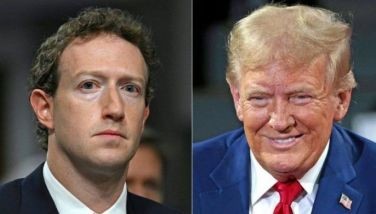Expert notes problems besetting ICT sector
May 25, 2001 | 12:00am
An expert in the information and communications technology (ICT) sector has identified several problems that continue to hamper the development of the sector into a major prime mover of the economy.
During a roundtable discussion participated in by leaders of the ICT sector at the opening of CommAsia 2001, Renato Garcia, ICT sector program director of the Ateneo Center for Continuing Education, said there is an urgent need to review, consolidate, or amend laws governing the information technology and telecommunications industry. These include those on convergence, privacy, intellectual property rights, voice over the Internet, anti-trust, unified backbone, among others.
Garcia said that right now, there are still conflicting laws that limit convergence when in fact, the so-called "giants" in the telecommunications field (First Pacific, Ayala, JG Summit and Benpres) are already into it.
Traditional telephone companies such as the Philippine Long Distance Telephone Co. are going into broadcast (PLDT through a subsidiary is taking over GMA Networks Inc.) and is also into data (through ePLDT). The group is also into cable (Home Cable which has now merged with SkyCable of the Benpres Group).
The Ayala group, on the other hand, owns Globe Telecom which is into voice and data transmission. Benpres Holdings meanwhile is also into voice and data (through BayanTel), broadcast (ABS-CBN), and cable, among others. The JG Summit group is likewise into voice and data and is soon entering the highly competitive cellular phone business (all through Digitel).
Transportation Undersecretary Agustin Bengzon said there is now a task force that is drafting a convergence bill for submission to Congress.
Rodolfo Salalima, president of the Philippine Electronics and Telecommunications Federation (PETEF), noted that while Section 28 of the recently passed E-Commerce Act provides that to foster further convergence, infrastructure or networks used for cable or wireless broadcast can be used for telecommunications. "But in doing so, Congress went back to the old definition of cable being classified as broadcast," he said.
There is a constitutional prohibition against telecommunications companies going into broadcast which means that PLDT itself cannot buy GMA-7, although the telecoms network or facilities can be used for broadcast.
Another issue that has yet to be resolved is who is really on top of the ICT sector. Right now, there are several agencies such as the Department of Transportation and Communication and the National Telecommunications Commission under it, the Department of Trade and Industry and the Information Technology Coordinating Council (ITECC) which the President chairs and the DTI secretary co-chairs, the Department of Science and Technology and the National Computer Center, and the Department of Education through the Commission on Higher Education.
Garcia also noted that government needs to address certain policy issues, such as the public access rights of carriers. Right now, telecommunications companies have difficulty installing cellsites due to issues of right of way.
He likewise pointed out that government may have to look at what incentives can be given to companies putting up broadband facilities since this is what the ITC sector badly needs. Right now, there is limited access to digital broadband network, especially in the rural areas, he said.
Garcia, who used to be the private telecommunications sector, said there is a need to realign regulatory and policy frameworks with emerging technologies since the sector is still governed by the old regime.
He said there are several networks currently available such as fiber optics, microwave radio, satellite, digital subscriber line, among others, which cannot be fully optimized due to certain regulations and lack of incentives.
During the forum, he also questioned the need for the 10-percent tax on international long distance calls, saying this has made Philippine IDD rates four times more expensive that those of other countries.
Garcia noted that even with the reduction of IDD rates by the major telecommunication companies to 40 cents a minute from $1.20 per minute, this is still expensive compared to those of Hong Kong and Singapore which are in the range of 12 to 18 cents a minute.
He likewise recommended that government and the private sector do an Internet future reality check considering the bursting of the NASDAQ bubble, the closure of many dotcom companies, and the slowdown in US capital spending.
During a roundtable discussion participated in by leaders of the ICT sector at the opening of CommAsia 2001, Renato Garcia, ICT sector program director of the Ateneo Center for Continuing Education, said there is an urgent need to review, consolidate, or amend laws governing the information technology and telecommunications industry. These include those on convergence, privacy, intellectual property rights, voice over the Internet, anti-trust, unified backbone, among others.
Garcia said that right now, there are still conflicting laws that limit convergence when in fact, the so-called "giants" in the telecommunications field (First Pacific, Ayala, JG Summit and Benpres) are already into it.
Traditional telephone companies such as the Philippine Long Distance Telephone Co. are going into broadcast (PLDT through a subsidiary is taking over GMA Networks Inc.) and is also into data (through ePLDT). The group is also into cable (Home Cable which has now merged with SkyCable of the Benpres Group).
The Ayala group, on the other hand, owns Globe Telecom which is into voice and data transmission. Benpres Holdings meanwhile is also into voice and data (through BayanTel), broadcast (ABS-CBN), and cable, among others. The JG Summit group is likewise into voice and data and is soon entering the highly competitive cellular phone business (all through Digitel).
Transportation Undersecretary Agustin Bengzon said there is now a task force that is drafting a convergence bill for submission to Congress.
Rodolfo Salalima, president of the Philippine Electronics and Telecommunications Federation (PETEF), noted that while Section 28 of the recently passed E-Commerce Act provides that to foster further convergence, infrastructure or networks used for cable or wireless broadcast can be used for telecommunications. "But in doing so, Congress went back to the old definition of cable being classified as broadcast," he said.
There is a constitutional prohibition against telecommunications companies going into broadcast which means that PLDT itself cannot buy GMA-7, although the telecoms network or facilities can be used for broadcast.
Another issue that has yet to be resolved is who is really on top of the ICT sector. Right now, there are several agencies such as the Department of Transportation and Communication and the National Telecommunications Commission under it, the Department of Trade and Industry and the Information Technology Coordinating Council (ITECC) which the President chairs and the DTI secretary co-chairs, the Department of Science and Technology and the National Computer Center, and the Department of Education through the Commission on Higher Education.
Garcia also noted that government needs to address certain policy issues, such as the public access rights of carriers. Right now, telecommunications companies have difficulty installing cellsites due to issues of right of way.
He likewise pointed out that government may have to look at what incentives can be given to companies putting up broadband facilities since this is what the ITC sector badly needs. Right now, there is limited access to digital broadband network, especially in the rural areas, he said.
Garcia, who used to be the private telecommunications sector, said there is a need to realign regulatory and policy frameworks with emerging technologies since the sector is still governed by the old regime.
He said there are several networks currently available such as fiber optics, microwave radio, satellite, digital subscriber line, among others, which cannot be fully optimized due to certain regulations and lack of incentives.
During the forum, he also questioned the need for the 10-percent tax on international long distance calls, saying this has made Philippine IDD rates four times more expensive that those of other countries.
Garcia noted that even with the reduction of IDD rates by the major telecommunication companies to 40 cents a minute from $1.20 per minute, this is still expensive compared to those of Hong Kong and Singapore which are in the range of 12 to 18 cents a minute.
He likewise recommended that government and the private sector do an Internet future reality check considering the bursting of the NASDAQ bubble, the closure of many dotcom companies, and the slowdown in US capital spending.
BrandSpace Articles
<
>
- Latest
- Trending
Trending
Latest
Trending
Latest
Recommended
































